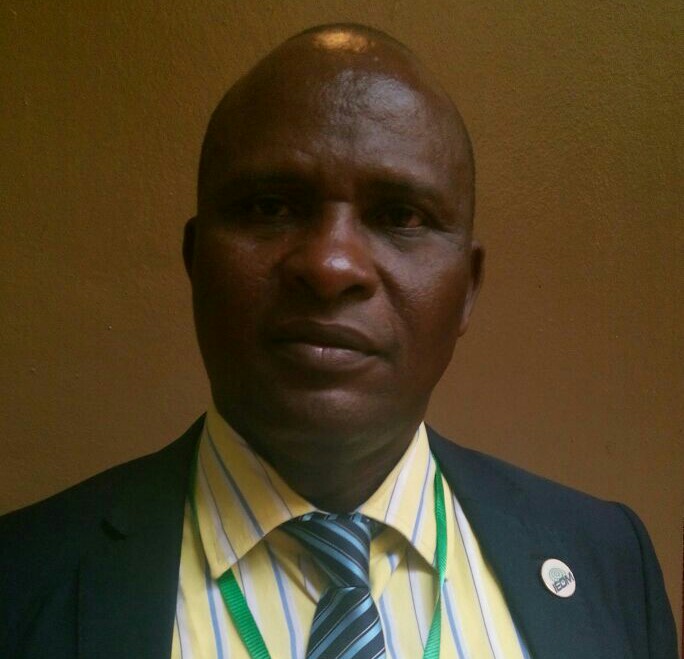Nigeria Needs Well-Structured Trade, Industrial Policies – Chukwu

By Kenneth Jukpor
Mr. Johnson Chukwu is the Managing Director of Cowry Assets Management Limited. In this interview with MMS Plus newspaper he shares his thoughts on the proposed increment in Value Added Tax (VAT), appraises the government’s excessive taxation drive, reveals strategies to reposition Nigeria’s economy, expounds the implication of CBN’s introduction of charges on cash withdrawals and cash deposits, among other pertinent fiscal issues. Enjoy it!
How would the introduction of charges on cash withdrawals and cash deposits affect Nigerian businesses and the fiscal environment?
The issue is a re-introduction of charges on cash withdrawals and cash deposits by the Central Bank of Nigeria (CBN) because the policy was first introduced by the previous CBN Governor, Sanusi Lamido Sanusi. It was suspended at some point by the current Governor but it has been re-activated or re-introduced. The basic purpose of that cashless policy is to encourage people to migrate from the use of cash to the formal banking systems such as transfer methods, use of cheques, transfer methods, electronic payment methods, among others. What it intends to achieve is a high level of financial inclusiveness and mitigate the risk associated with carrying cash such as theft and robbery.
Clearly, the objective is altruistic as it is supposed to help improve the economic activities in the country because when we have more transactions going through other methods than cash, we have a high level of formalization. It also helps CBN to play its arbitrary role in taking money from the deficit units and giving to the surplus units. The only challenge we have with the re-introduction of this cashless policy is that it is coming at a time when there are other policies contradicting its purpose. Some policies contrary to the objective of the cashless policy are taxes levied on online transactions, the imposition of Value Added Tax (VAT) on online transactions and the issue of stamp duty charges on debit and credit into customers’ accounts. This has also been worsened by the directive from CBN that transactions involving merchants should be unbundled and taxes imposed on individual transactions on N1000 and above. Such policies on imposing taxes on online payment platforms and unbundling, taxing and imposing stamp duties on all POS transactions involving N1000 and above will negate the objectives of the cashless policy which the introduction of charges is supposed to serve.
These additional costs that customers would bear if they migrate to alternative transaction methods will push them back to cash transactions. The contradictory nature of these objectives may end up forcing Nigerian business persons to begin storing cash in their homes to avoid these charges. I expected that if the government wants to encourage a cashless policy environment, they would make online payment platforms and other alternative platforms relatively cheaper so that people would be motivated to migrate from cash transactions to other online methods.
It would have been easier for people to run away from cash to other platforms where there are little or no charges. If we have charges at both ends, then there is going to be confusion and business people may be compelled to begin to keep their cash at home. That’s the challenge we have. If the charges were implemented without charges on the online transactions which is the natural option that people should go to, then we would say that the re-introduction is a very laudable initiative.
The challenges that arise as a result of the servers of telecommunication companies are still prevalent. Do you think this would continue to pose a threat to the cashless system? Most Automated Teller Machines (ATM) malfunction at weekends. How do you reconcile this?
The online payment platforms because of the taxes placed on them are also been discouraged. In the past, the issue was more about network fluctuations and technological challenges, but we didn’t have charges with online payment platforms. There has been some improvement in technological infrastructure over the past two or three years. There has been improvement in broadband penetration as you would find that most locations have 3G network services. With 3G you can do most of the electronic transactions, so I think that we have overcome the challenge of network fluctuations.
If you look at the areas where we have enormous financial transactions, most of these locations are covered by strong networks. For those people located outside the urban areas, CBN introduction of inter-agency banking should be able to serve with the licensing of telecos as agent banks. This would also help reduce the infrastructure challenges we had with electronic payment platforms.
The increase in Value Added Tax (VAT) has also attracted wide criticisms from several experts. With the recent signing of the African Continental Free Trade Agreement (AfCFTA) there are arguments that this would further put Nigeria in a disadvantaged position in terms of competitiveness Nigerian producers should have. What’s your opinion on VAT increase?
The VAT increase has only been proposed because the Minister of Finance has said it would have to go through the national assembly to amend the VAT Act, even as she assured that they would also consult widely with the general public before implementation.
However, if they go through with the proposed VAT increase to 7.2%, I must mention upfront that Nigeria’s VAT is one of the lowest in the world. It is only comparable to Indonesia, Saudi Arabia and one other country that charges VAT at 5%.
Having said that, the focus of the government on taxing the citizens more may not be the solution to the economic challenges the nation is facing. I believe that the first thing the government should be considering is to come up with policies that would expand economic activities and expand productivity for more income. With that expanded income, even at the same VAT rate the government would be able to generate more revenue.
Increasing VAT alone may not be a bad idea, but would this have a positive impact on government revenue given the level of poverty in the country. Nigeria has over 94 million people living in abject poverty. If you impose VAT that would lead to further reduction in consumption, it would affect the manufacturing sector and the trade sector.
Ideally, an increase in VAT should be imposed when the economy of a nation is buoyant and not when an economy is in a very weak situation. Among the benefits of VAT, is that it is supposed to moderate the level of consumption but Nigeria’s consumption has weakened because we have weak consumer demand. Additional charges could tip the scale in the economy and lead to an economic recession.
If you look at the second GDP figures, you will realize that the manufacturing sector was in the negative, the trade sector was also in negative and most of the sectors apart from the telecommunication sector were all in the negative. Those that did not go into the negative had a slower growth rate. So, I think that this might not be the most auspicious time to impose consumption tax that would weaken the power of the citizens, lead to an increase in cost and may not necessarily expand the revenue base of the government.
Something similar is the border closure and the argument is that the essence is to boost local production and consumption of rice as well as poultry products. We know that the agricultural sector has observed growth over the years. From your perspective, do you think this is the proper way to go about these trade issues?
The border closure is just an additional toll that they have set for some of those agencies whose duties are to work at the border. I’m sure you know that rice is still smuggled into the country and poultry products are still coming into the country. This action by the government would only help to increase the sums that people pay to bring these products into the country. We have already seen an increase in the value of rice in the consumer market. So, the average Nigerian is paying additional charges and this doesn’t come to the government unfortunately. Remember that there was already a ban on importation of rice through the land border and also a ban on importation of poultry products. I don’t think that is the solution to the problem.
An increase in the production of rice and any other farm produce is not something that happens overnight. I don’t think it’s sufficient to say that you close the border to just increase the production of rice. We need to have a well thought out trade policy and an industrial policy. The trade and industrial policy will guide us on some of these issues so we don’t respond at the spall of the moment. If we have a well thought out policy on industry and trade, we would determine what kind of tariffs we can impose pending the advent of the Africa Continental Free Trade Agreement (AfCFTA), because once that becomes operational, we will lose the right to have discriminating tariffs contrary to what other regional countries have.
It’s relatively a new presidential administration. One area that a lot people didn’t agree with President Mohammadu Buhari was his management of the economy in his first tenure. You have highlighted the need to have well-structured trade and industrial policies; what other issues would you highlight in order to fix Nigeria’s ailing economy?
Nigeria needs to review its current fiscal policy environment. Fiscal policy environment with regards the budgetary process as the nation’s budget in the last five years hasn’t achieved more than 60% revenue target. This means that the government has consistently increased its borrowing to compensate the shortfall in the revenue projections. We are getting to a point where debt service is accounting for approximately 60% of our current revenue and that is not sustainable. If we are not careful that ratio will increase further until it gets to more than 100%.
The starting point is for us to ask ourselves how we will fund our fiscal expenditure. It may not necessarily come from the structure that we have now. The current structure we have is not sustainable. We cannot continue to borrow to meet recurrent expenditure. We can’t continue to borrow to meet the debt service without building any structure for the loan repayment.
Some of the expenses are not creating much value in the economy so we can easily eliminate these expenses. One of such expenses is the petroleum product subsidies. We currently spend about N1.2 trillion on subsidizing petroleum products. I believe it’s high time that we take that out and deploy that N1.2trillion in other critical sectors of the economy that has multiplying benefits on the social and economic position of the nation.
Recently, the Afreximbank president pointed out that for Nigeria to have a better economy and develop the nation, we may to look beyond politics and focus our ideas on commerce as China did over the years to grow its economy. Do you subscribe to such strategies?
That’s why I said Nigeria needs to have a clearly defined trade and industrial policy. China had a clearly defined industrial policy and trade policy which guided the decisions of the government to positioning the economy. At some point, the Chinese economic policy was built on an export-oriented industry where at that point China recognized that its population was very big but didn’t have the purchasing power to support industrialization. Therefore, it had to manufacture products for the export market.
Right now, the level of per capital income in China has improved and the external market is shrinking. So, what has China done? China has changed its policies to now focus on local consumption. Those are what we call dynamic economic policies that will now trickle down to your trade policy, manufacturing policy, educational policy and your health policy. You cannot threat any of these in isolation.
For example, if you want to build the economy as an industrial base, you ought to have strong technical education from the primary school to tertiary level. People that graduate from your schools must have technical strength. Your current educational curriculum will be aligned with your industrial policy and be aligned to the government policy. We need to get to that point of strategic thinking.
During a recent chat with one of the executives at Development Bank of Nigeria (DBN), she lamented that despite giving out loans to commercial banks for on-lending to MSMEs, the level of inflation has always been a limiting factor influencing the interest rates. How can the nation address this problem to enable Nigerians access intervention funds?
I think an effective interest rate should always be higher than the rate of inflation. That’s where you talk about positive interest rate. Interestingly, in the past couple of years, we have not seen the positive real interest rate as it relates to the intervention funds.
As it relates to lending to the critical sectors when the government is intervening, they have always enjoyed borrowing below the inflation rate. Ideally, the inflation rate should be lower than the interest rate. Otherwise, people wouldn’t keep their monies in the bank because it would be better to consume today than to save when you know that the value of the money would depreciate when you need it.
Having said that, high inflation rate leads to high interest rate and high interest rate is a harbinger to default. The likelihood of default in loan repayment increases once as a result of high interest rates. So, most economic managers across the world thrive to maintain low inflation rate so that they can have low interest rate to support productive activities. There is a direct correlation between interest rate and productivity.
The reason Deposit Money banks are reluctant to give loans from on-lenders like the Bank of Industry (BoI) and DBN, is that the primary credit risk still resides with the banks. So, in event of default, because the banks act as guarantors they are expected to pay back the loans to the providers like BoI and DBN. The banks need pre-qualify the borrowers to meet their credit standards and many of these customers may not meet the standards of such banks. The banks wouldn’t lend to people who don’t meet their standards irrespective of the fact that the money is coming from development finance institutions because the banks still carry 100% of the credit risk. To resolve this problem, the development financial institutions and the banks have to go into a risk sharing arrangement so that the banks don’t have to bear 100% of the risks.








